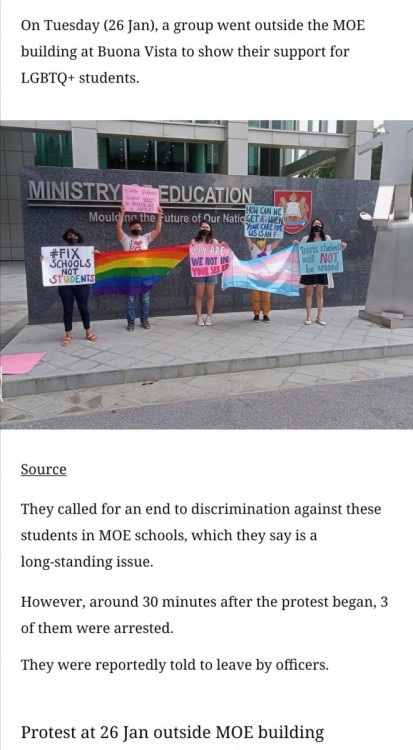Search the Community
Showing results for tags 'lgbtq'.
-
I’m sure this is just the tip of the iceberg. it was Cos of social media this has happened. I can bet you, the staff concerned is not the only one with such thinking. How did it get approved in the first place? @Jamesc you complained ah😂 https://www.todayonline.com/singapore/hci-lgbtq-presentation-reprimanded-suspended-1946691?fbclid=IwAR1taT5nSIOpP0U3NOaLyAISfQ_H2qbooHCjrkhsCq_YruJZUJzH_CJPzxo&fs=e&s=cl
-
https://asia.nikkei.com/Opinion/How-Japan-Inc.-can-do-even-more-to-boost-LGBTQ-inclusivity?utm_campaign=GL_JP_update&utm_medium=email&utm_source=NA_newsletter&utm_content=article_link&del_type=4&pub_date=20211111090000&seq_num=20&si=44594 How Japan Inc. can do even more to boost LGBTQ+ inclusivity Important progress should not be allowed to mask a still troubling reality People gather during a rally calling for the anti-discrimination legislation in Tokyo on June 6: Japan remains one of the few advanced economies without laws to prohibit discrimination on grounds of sexual orientation. © Getty Images Masa Yanagisawa is head of prime services at Goldman Sachs in Japan and chief operating officer for the company's Asia Pacific LGBTQ+ Network Council. This year marks the tenth anniversary of work with Pride (wwP), a nonprofit group formed to promote greater inclusivity for LGBTQ+ people in Japanese workplaces. Later today, the group will announce the results of the latest PRIDE Index -- a widely recognized score card for Japanese companies' inclusivity which is now in its sixth year. Reflecting on wwP's achievements over the past decade is a reminder of how much progress corporate Japan has made, but also how much more the country still has left to do. From the outset, the fate of wwP's mission was uncertain. Two of its founding members, IBM Japan and Human Rights Watch, were international organizations. The fledgling organization turned to western companies, such as my own employer Goldman Sachs, for advice on nurturing inclusive environments. Work with Pride's first and flagship initiative -- a seminar on LGBTQ+ issues in the workplace in 2012 -- was hosted in IBM's offices and focused on the U.S. giant's best practices. Skeptics sneered that LGBTQ+ rights was a foreign issue, irrelevant to Japanese society. But progress came the very next year. In 2013, Sony, one of the bluest of Japan's blue chips, offered their space for the second seminar. Held annually, the event began attracting attention across corporate Japan. Attendance soon ran into the hundreds. In 2017 it was hosted by the Japan Business Federation, or Keidanren, Japan's biggest business lobby that is almost synonymous with Japan Inc. Today, the seminar's steering group consists of representatives from Japan's most prestigious companies, including Panasonic, NTT, Dai-Ichi Life Insurance and Recruit Holdings. Japan's progress toward LGBTQ+ workplace inclusion can be seen clearly in wwP's PRIDE Index. Launched in 2016, the index rates companies' efforts across five categories such as policy, representation, inspiration, development and engagement/empowerment, and provides a set of best practices and bench marks to guide their journey to a more diverse, equitable and inclusive workplace for LGBTQ+ people. In its first year, 82 companies participated in the index, with 53 achieving the top gold ranking. Those figures have grown every year since, rising to 233 participants, and 183 gold recipients last year. The 2021 index, to be announced later today, will hit records for participation and gold awards. This momentum is encouraging. But we must not let it mask a more troubling reality. The overwhelming majority of companies in Japan are small-and-medium sized enterprises. However, most of those participating in the PRIDE Index are large-scale corporates with more than 300 employees. Smaller companies still account for less than 20% of the total. According to a 2020 government survey, only just over 10% of companies in Japan have policies aimed at protecting the rights of sexual minorities. Larger companies were more likely to have provisions for LGBTQ+ employees. By contrast, this is the case at only 9.4% of companies with 100 to 999 workers, and 3.5% of companies with 99 or fewer workers. This is not to say that smaller companies are by definition less inclusive. But what is clear is that workplace inclusion remains a serious issue in Japan, and that LGBTQ+ people are facing discrimination and harassment in their jobs across the country. According to the same government report, 36.4% of lesbian, gay, or bisexual individuals and 54.5% of transgender individuals experienced difficulties in the workplace due to their sexual orientation or gender identity. A study by NPO Nijiiro Diversity showed that roughly 60% of LGBTQ+ people in Japan report hearing negative comments about sexual orientation at work. It also found that mental health was "significantly worse" among LGBTQ+ individuals when compared with the broader population. Given the extent and gravity of the situation, there is clearly a limit to what nongovernmental organizations such as wwP can do. Japan remains one of the few advanced economies without laws to prohibit discrimination on grounds of sexual orientation, or to permit same-sex marriage. Yet it is progress in these two areas that has the greatest potential to improve LGBTQ+ inclusivity in Japanese workplaces. Dedicated and fit-for-purpose anti-discrimination legislation would likely have a direct and tangible impact, pushing hitherto indifferent companies to review their policies and practices. Legalizing same-sex marriage could effect change at multiple levels; crucially, it would send an unequivocal message about LGBTQ+ people's right to equal treatment. esbian couple, pictured at Shibuya crossing in Tokyo on Mar. 19: legalizing same-sex marriage could effect change at multiple levels. © Reuters In addition, it would ensure all companies offer equal benefits to their employees with partners, regardless of gender, and eliminate the need for ad hoc workarounds for same-sex relationships that have been costly, complicated and beyond the reach of most SMEs. The cumulative impact could be transformational. There is an ever-growing body of research that demonstrates that diverse, equitable and inclusive societies and companies enjoy better economic growth, while discrimination on the basis of sexual orientation or gender identity negatively impacts the prospects for business success. With its aging population and ambiguous stance on immigration, the imperative for Japan to engage the full diversity of its workforce is clear. Work with Pride will continue on its mission. This year's PRIDE Index includes a new Rainbow Accreditation recognizing companies for their collective efforts toward promoting awareness and understanding of LGBTQ+ issues and the achievement of equal rights. Goldman Sachs employees of its Tokyo office take part in Pink Friday in November 2019. (Handout photo from Goldman Sachs) Later this month, Goldman Sachs will be welcoming around thirty Japanese companies to join Pink Friday, an annual tradition which began in Hong Kong and has now spread globally, in which our people wear pink on a Friday in November in a visible demonstration of for LGBTQ+ inclusion. Ten years ago, it would have been difficult to imagine Japanese companies rallying around such an event, let alone seeking recognition for collective action on LGBTQ+ rights. Japan Inc. has come far. Let us hope that lawmakers catch up.

.png)





